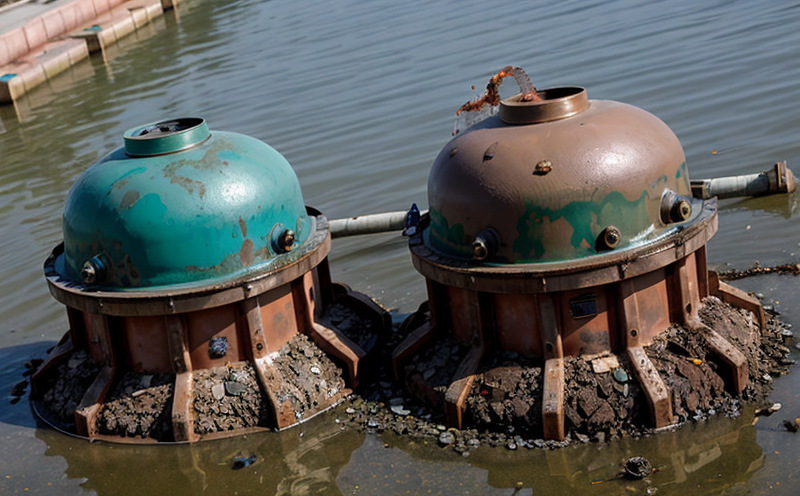ISO 7539-6 Stress Corrosion Testing of Stainless Steels
The ISO 7539-6 standard provides a detailed methodology for performing stress corrosion cracking (SCC) tests on stainless steels. This test is critical in industries where materials are subjected to tensile stresses and corrosive environments, such as the aerospace, chemical processing, and oil & gas sectors.
The primary objective of this testing procedure is to identify potential SCC susceptibility in stainless steel specimens under specific conditions. By subjecting the material to a combination of stress and corrosive media, it is possible to simulate real-world environments where failure may occur.
The test involves several key steps: specimen preparation, immersion in the appropriate solution, application of tensile stress, and observation for crack formation or propagation. The process requires precise control over variables such as temperature, humidity, and solution composition to ensure accurate results.
Understanding SCC is vital because it can lead to catastrophic failures in critical components, resulting in significant financial losses and safety risks. By identifying potential issues early through this testing method, manufacturers can implement preventive measures to enhance the durability and reliability of their products.
The ISO 7539-6 standard ensures consistency and repeatability across different laboratories by providing clear guidelines on specimen preparation, test parameters, and evaluation criteria. This standard is widely recognized in global markets, making it essential for companies seeking to comply with international quality standards.
For R&D engineers, this testing method offers valuable insights into the performance of new materials under stress-corrosion conditions. It allows them to optimize material properties and design more resilient products. For procurement teams, ISO 7539-6 ensures that suppliers meet stringent requirements for corrosion resistance in high-stress applications.
Compliance with this standard is increasingly important as industries face stricter regulations regarding product safety and environmental impact. By adhering to ISO 7539-6, companies can demonstrate their commitment to quality and reliability while maintaining competitive advantage in the global market.
| Industry | Application |
|---|---|
| Aerospace | Testing of engine components for durability under stress-corrosion conditions |
| Chemical Processing | Evaluation of piping and storage tanks exposed to corrosive chemicals |
| Oil & Gas | Assessment of pipeline integrity in harsh environments |
| Power Generation | Detection of potential SCC in turbine blades and other critical components |
Why It Matters
The significance of ISO 7539-6 stress corrosion testing cannot be overstated, especially for materials used in high-stress environments. Stress corrosion cracking can occur even when the material is exposed to a relatively low level of corrosive agents and tensile stresses.
Understanding SCC helps prevent catastrophic failures that could lead to severe consequences such as equipment damage, production downtime, and safety hazards. By identifying potential issues early through this testing method, manufacturers can implement corrective measures to enhance product reliability and longevity.
The importance of ISO 7539-6 lies in its ability to provide a standardized approach for evaluating the performance of stainless steels under specific conditions. This ensures that test results are consistent and comparable across different laboratories and regions, fostering trust and confidence among stakeholders.
For industries where product safety is paramount, compliance with this standard demonstrates a commitment to excellence and reliability. It also enhances brand reputation by showcasing a company's adherence to international quality standards.
Benefits
- Early detection of potential SCC in stainless steel specimens
- Consistent and repeatable test results across different laboratories
- Enhanced product reliability and durability through optimized material properties
- Compliance with international quality standards, ensuring trust among stakeholders
- Cost savings by identifying issues early in the development process
- Improved safety for end-users by preventing catastrophic failures
- Increased competitiveness in global markets by meeting stringent regulatory requirements
- Promotion of sustainable practices through optimized material usage and design
Industry Applications
ISO 7539-6 stress corrosion testing is particularly relevant for industries where materials are subjected to tensile stresses in corrosive environments. Some key applications include:
| Industry Sector | Specific Application |
|---|---|
| Aerospace | Evaluation of engine components for durability under stress-corrosion conditions |
| Chemical Processing | Evaluation of piping and storage tanks exposed to corrosive chemicals |
| Oil & Gas | Assessment of pipeline integrity in harsh environments |
| Power Generation | Detection of potential SCC in turbine blades and other critical components |
The test is also valuable for manufacturers developing new materials and products, providing them with crucial insights into the performance of their designs under real-world conditions.





